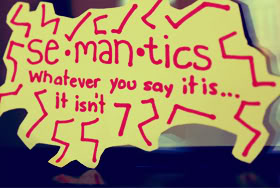 I’m sure you’re wondering why you need to know anything about semantics and how this can help you get the job you want. Semantics is the study of the meaning of language. It also deals with varieties and changes in the meaning of words, phrases, sentences, and text. Just in case you’re still not sure what it means, semantics is what you say and how you say it.
I’m sure you’re wondering why you need to know anything about semantics and how this can help you get the job you want. Semantics is the study of the meaning of language. It also deals with varieties and changes in the meaning of words, phrases, sentences, and text. Just in case you’re still not sure what it means, semantics is what you say and how you say it.
Let’s look at an example of how meaning can change by reviewing the word “create.” Create can mean build, make, construct, erect, compose, or imagine. Another example is how the simple word “on” can have many meanings: on call, on the roof, on cloud nine, on edge, on fire, on purpose, on demand, on top, or on the phone. Semantics helps you choose the most effective words for your cover letter and your resume. You can choose from a list of words to communicate how you are the most qualified candidate for the job. This is why it is imperative that we learn to communicate effectively with those we want to do business with and those who may want to do business with us.
Semantics is communication. It uses different words to imply a desired meaning. Business semantics are what you use to answer the question “What is your greatest weakness?” We wonder why they are asking us this. Did I say something wrong? How do I respond? Your use of semantics can make you seem even more polished and professional when you are able to answer the tough questions that everyone dreads.
Here are some potential responses you might give “My greatest weakness is completing tasks in a timely matter because I’m a perfectionist.” Or you can say “I’m just not that good at finishing stuff.” Dear future employee, please choose door number one! You may also say “I have had issues with project completion.” Do you say that to an interviewer? No! You just may be able to get away with saying “I’ve had some pretty close calls with project completion quite some time ago. Since then I have designed a flow chart that had a timeline for my project completions, and I am able to finish my projects with time to spare.” To add support to your claim, give an example of said project or show them the flow chart.
How can I use semantics to my advantage and why do semantics work? Semantics is the combination of verbal communication, non-verbal communication, and self-confidence. Let’s say you don’t have enough experience for the job you want but are confident that with your previous job history, you can do the job. The verbiage on your resume should highlight your strengths that apply to the position you are applying for.
Let’s take the word “strength” as an example. Instead you can use fortitude, tenacity, stableness, energy, steadiness, or courage. A thesaurus is an excellent resource to help you find other words to add you your vocabulary. In the book Semantics in Business Systems, David McComb states “New words aren’t usually invented; rather new meanings are imposed on the words and phrases already being used.” Your use of Semantics is your power and how well you wield it can change that interview into your dream career.
Semantics is always in action, even if you don’t realize it. You may use semantics as a play on words or as an intentional pun. Puns use multiple meanings of words and homophones (where the pronunciation is the same but the spelling and meaning are different). You can say almost anything you want! If you want to go far in business or anywhere in your life, you must be able to communicate effectively. Semantics is an important portion of the communication process. With your expert use of it you will be a dream to any interviewer and practically any job you apply for will be at your fingertips.
Stay focused, take your time and choose your words carefully. Your future is in your hands.
Hello??? That was semantics!
Penned by Salima Harris
Your CC Connection


